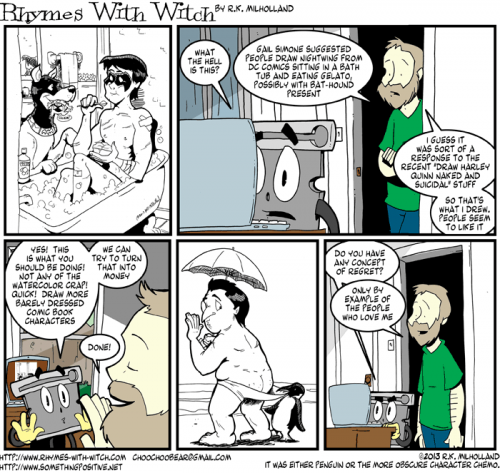If only I’d read this information before I sent my daughter off to college! Apparently, it was a bad idea — according to Fix The Family, I shouldn’t have done it, and they have six seven eight absolutely solid reasons. (It’s so well-written: the title is “Six reasons to not send your daughter to college”, but it actually lists eight.)
-
She will attract the wrong types of men. Apparently, the universities are full of “lazy men who are looking for a mother-figure in a wife are very attracted to this responsible, organized, smart woman who has it all together along with a steady paying job with benefits.” I think it’s nice that this web site is so egalitarian: not only do they want to deprive women of an education, but they also have nothing but contempt for the men who are getting one.
Clearly, I’m going to have to have a little talk with my daughter’s boyfriend.
-
She will be in a near occasion of sin. This is my favorite excuse: sex produces hormones that befuddle the female mind, making them overlook the faults in those horrible lazy college men.
Catholic OB-GYN Dr. Kim Hardey notes that a woman is naturally very observant of a man’s faults as long as she is in a platonic relationship with him. Once she becomes sexually active with him, she releases hormones that mask his faults, and she remains in a dreamy state about him. We can see why God would arrange things in such a way so that when in a proper state of holy matrimony, she would be less sensitive to his faults and thereby less tempted to be critical of him.
I have relied on surges of estrogen, progesterone, and oxytocin to keep my wife in a confused state for years. How else would she stay with me? So this must be true.
-
She will not learn to be a wife and mother. Yep, that’s right: we don’t offer college courses in cooking, cleaning, changing diapers, all that womanly work. So what good is it?
-
The cost of a degree is becoming more difficult to recoup. “Like anything that is subsidized by the government, the cost of a college degree is inflated.” Wait, what? Subsidized education is more expensive? That makes no sense. Besides,
It makes much more sense for a young couple to have a husband with a skill that brings value to the marketplace that has reasonable compensation to go along with it and a wife who is willing to be frugal especially during the early years of starting their family.
So send the man to school to acquire skills that have value, but don’t send the woman to school because schools don’t teach skills that have value. Mmm-k.
-
You don’t have to prove anything to the world. Women only go to school to show off.
-
It could be a near occasion of sin for the parents. School is so expensive, you know. “So parents may avoid having more children with contraception, sterilization, or illicit use of NFP to bear this cost.” Investing in your children compromises your ability to have more children.
-
She will regret it. In years to come, they will be so sad about wasting their most fertile child-bearing years improving their minds instead of their uteruses.
-
It could interfere with a religious vocation. This is the most terrible one of all: Catholic seminaries will not accept you if you have a load of college debt!
And there’s more! If you watch this video from Fix the Family, you also learn that “We have a little problem with depopulation, and we need these young ladies to be havin’ babies.”


